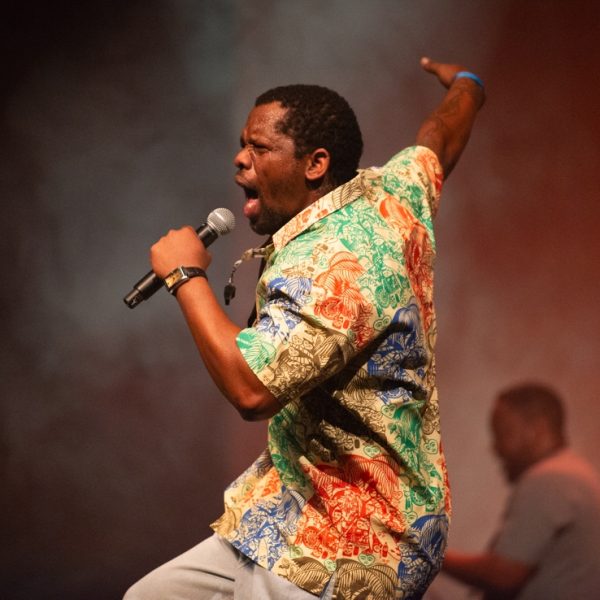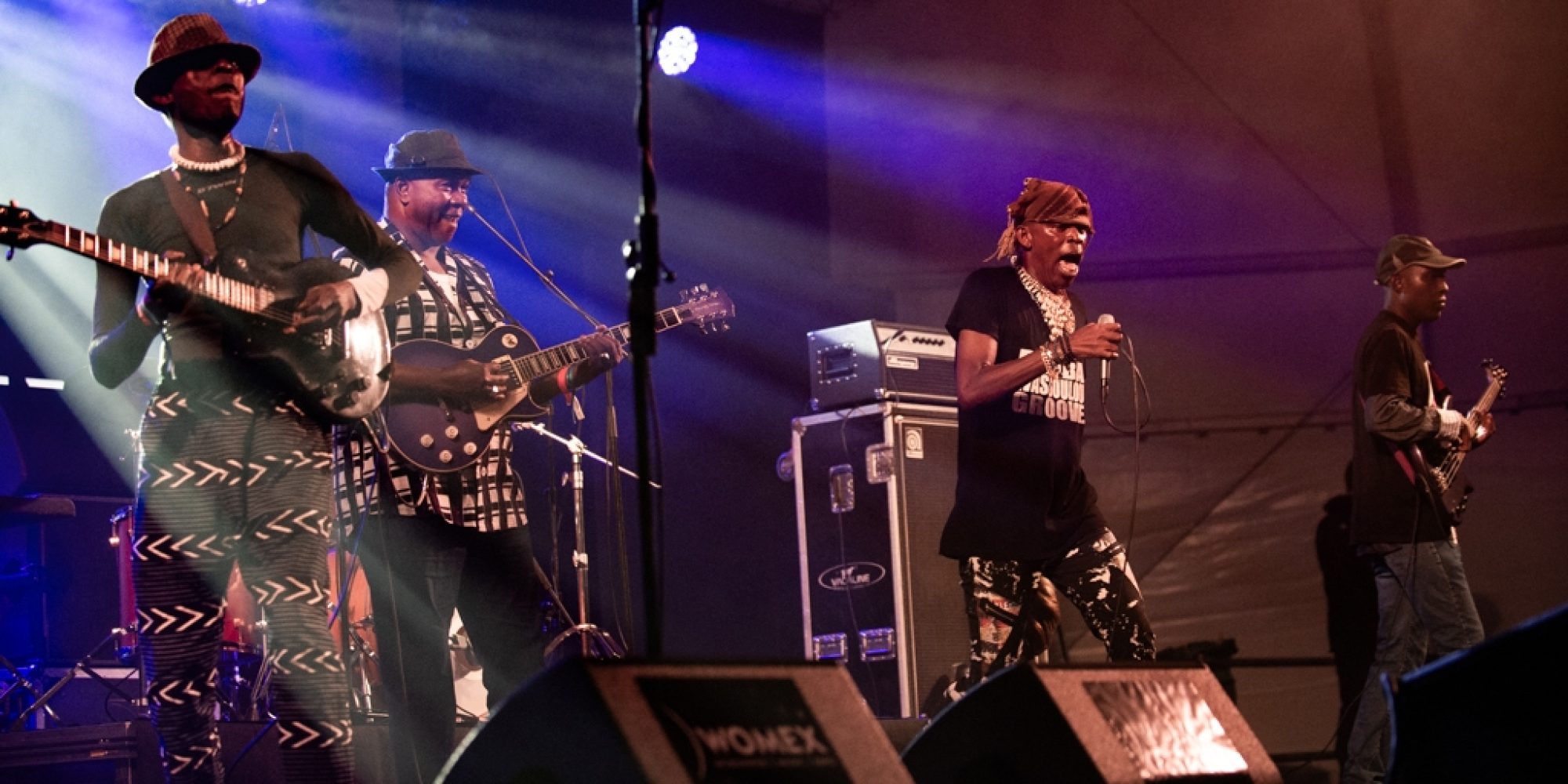Each year, come late October, there is a gathering of what could be described as a tribe – this year it was nearly 3000 people, from over 100 countries. There are no real rules to join this tribe, no initiations, no uniforms, and no secret handshakes to learn. The only requirement is a passion for and a desire to proliferate, what we are sometimes reluctant to call for lack of a better term, “world music.” This year this gathering, its 23rd edition, called WOMEX, or officially, The Worldwide Music Expo, took place in the northwest of Spain, in the seaside city of A Coruña from October 25-28. (See Banning Eyre’s photo essay of WOMEX 2023 performers here.)
While outside the city's borders, there were still wars going on, political, social, and economic strife, within the conference center and its surrounding venues, nations and cultures were united—all attendees communicating with the common language of music, often music you've never encountered before. Beyond the entertainment, beyond the business of entertainment, what you saw were people, often crossing borders and the divisive political rhetoric of our time, to eat, drink, party and play music together. Perhaps the best example of this was in the afternoons, after business was done, musicians from all points on the map would get together in the beer and wine tent just outside the convention hall doors to jam. Every culture, ethnicity, language, color, religion, and gender would be represented. I don't think anyone left this year's conference without a greater belief in the power of music to transcend the follies and madness out there and that there may be no greater tool to advocate for peace, love, and understanding than song.
But enough of this lofty and esoteric stuff... you're here to read about the music we saw. While there is no way one can catch all the acts showcasing, but your intrepid reporters did their best. There are no winners or losers here, we can only say this performer or that one left us spellbound, or made us move our hips and let our backbone slip. Maybe for you, it would be another that didn't for us.
It should be noted that there was a lack of bands actually based in Africa due to the ongoing issues for artists from the continent being able to get travel visas to perform. For example, we were looking forward to seeing Togo funk legend Roger Damawuzan, but he had to cancel for that reason.
So let's start with the two acts that most impressed us over the four nights of music.
There was a lot of buzz earlier that day about the Manchester-based The Breath, a folk duo of Ríoghnach [pronounced “Ree-uh-na”] Connolly and guitarist Stuart McCallum. People we trust kept whispering about them – “You must see The Breath.” While not in our Afropop wheelhouse, we have to offer you to check them out. The Breath began as a four-piece, with a pianist and drummer. Baring Connolly, the others were all members of the famed experimental downtempo band The Cinematic Orchestra. But on their latest album, Land of My Other, their third, on Peter Gabriel's Real World label, they've whittled it down to just the duo, which is really all they needed. McCallum has been called one of the great guitarists of our time and Connolly is both vocally and personality-wise a true force of nature. She commands the stage with her presence, and while her singing is angelic, between songs she growls, laughs, and makes wisecracks like a character out of a 17th-century Irish bordello. I was so taken by them that I had to skip seeing the next act, to just take time to finish absorbing their mesmerizing set.
Now while we were glued to our seats during The Breath, we were wild on our feet during the set from Bamako, Mali's Bamba Wassoulou Groove. Led by three guitarists, notably Moussa Diabaté of Super Rail Band fame, the rest of the band are young, highly energetic players. Originally formed in 2013, was organized by Bamba Dembélé, co-founder of the influential Super Djata Band of the 1980's, and who passed away in 2018. But the band lives on and the crowd in the venue went wild. A conga line of at least fifty participants wiggled and weaved its way through dance floor. If you want to spend a night burning unwanted calories, catch this group wherever and whenever you can.
Now that we've knocked off those two, let's go back to the opening night concert, which was an evening in tribute to our Galician hosts. As noted, A Coruña is located at the northwestern edge of Spain, bordering the Atlantic Ocean on the west and Portugal in the south. The Galicians have inhabited the area for tens of thousands of years, or even more so. One of the highlights of visiting the city is the Roman lighthouse, known as the Tower of Hercules, and is the oldest known lighthouse still in existence, a UNESCO World Heritage site, and is believed to have been built in the 1st century AD. Similarly, the culture, and especially its folk music, has its roots in Celtic traditions. The latter 20th century saw a revival of the folk music tradition that has continued to this day. We were treated to four acts that ranged from traditional to electronic music. We were especially taken by the traditional folk duo Caamaño and Ameixeiras.
Thursday showcase highlights included Ghanan singer Florence Adooni who, along with German producer/musician Max Weissenfelt, has created a kind of cool retro-soul vibe mixing highlife and Frafra gospel traditions. We'll be featuring an interview with them shortly.
We also caught the Congolese group Kin'Gongolo Kiniata. They are “master upcyclers,” playing self-made percussion and stringed instruments assembled from discarded plastic bottles, metal objects and household items. Their name comes from the sound heard when itinerant oil sellers walk the streets during power cuts, carrying the clanging metal containers, which provide an alternative source of light. At first we weren't sure what to make of them, but about halfway through their set, the group I was with suddenly turned and looked at each other declaring “Hey! These guys are pretty good!”
We couldn't have been happier than to end Thursday night with the Colombian band La Sonora Mazurén, who put on a killer set of their highly-danceable psychedelic Afro-Colombian cumbia -- and then throw in a bunch of other influences. The superstar of the group is percussionist and singer Diana Sanmiguel who is a joy to watch on stage. They probably rank as our third favorite act of the entire conference.
Moving on to Friday night, we caught the 79er's Gang, a New Orleans Mardi Gras Indian outfit. Led by Big Chief Romeo Bougere of the 9th Ward Hunters and Big Chief Jermaine Bossier of the 7th Ward Creole Hunters, had conference-goers shakin' and stirrin', though we felt that their repertoire of mostly covers of classic New Orleans material made them a good out-for-a-night party band, but nothing really innovative or that stood out for us.
Next up were the Brussels-based Aleph Quintet, who are led by French violinist Marvin Burlas, and Tunisian oud player and violinist Akram Ben Romdhane. The duo met when they were next-door neighbors and heard each other practicing through their apartment walls. Their Middle-Eastern infused jazz set was simply beautiful. As they expressed to us earlier that day, their music speaks of brotherhood and a world without borders where musicians are free to travel and perform together, as expressed in their song, “Okhoua.”
We were fascinated by Avalanche Kaito, another group based in Belgium. Described as a “griot post-punk noise” futurist band, that pretty well sums them up. One-string bow and flut player and griot Kaito Wimse from Burkina Faso left his home for Europe in search of, as he says, “music that didn't yet exist.” He met up with drummer Benjamin Chaval and the guitarist Nico Gitto, and the trio definitely fulfilled Kaito's musical desire. Watching Kaito jump, dance and fling himself across the stage, he's an incredibly charismatic and commanding figure. Though we'll admit their music might not be for everyone's taste, they should be recognized for the music's originality and raw energy.
Our evening ended with another energetic set from Jinj. Led by French-born Armenian singer Sevana Tchakerian and Armenian-born Gor Tadevosyan, their original music is often based on traditional Armenian folk songs, but given a rock or techno interpretation. In fact, as they told us, they decided to call their music “Armo-beat,” because when asked to describe their music they always fell short trying to do so. And so what is “Armo-beat?” It's whatever you think it is, they said. However you want to define it, their mission to give voice to their fellow Armenians, both at home and those in exile… and get you dancing.
We already mentioned two of the bands we saw on Saturday, but at the start of the evening we were delighted by Brazilian singer/guitarist Anna Tréa. Currently based in Spain, Tréa was a last minute addition for the slot that Roger Damawuzan was to have. So going on stage with just her voice and her guitar, she nonetheless filled the room with her Afro-Brazilian sounds. We'll be featuring an interview with this captivating performer shortly.
And that’s our field report of the best of WOMEX 2023. See you in 2024....
Related Audio Programs
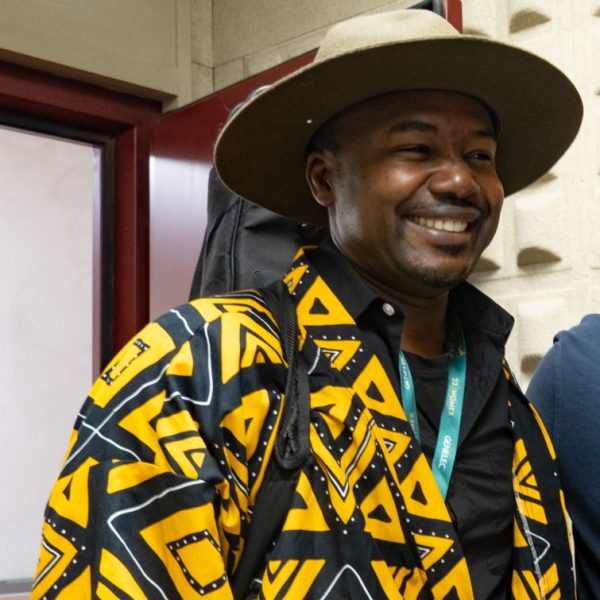
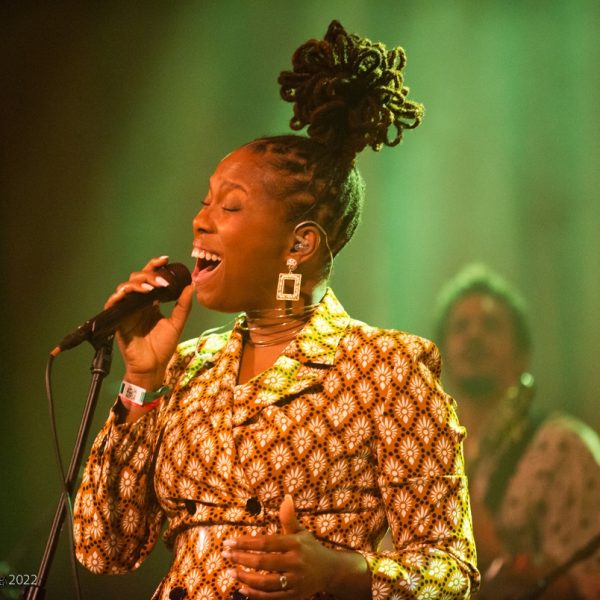
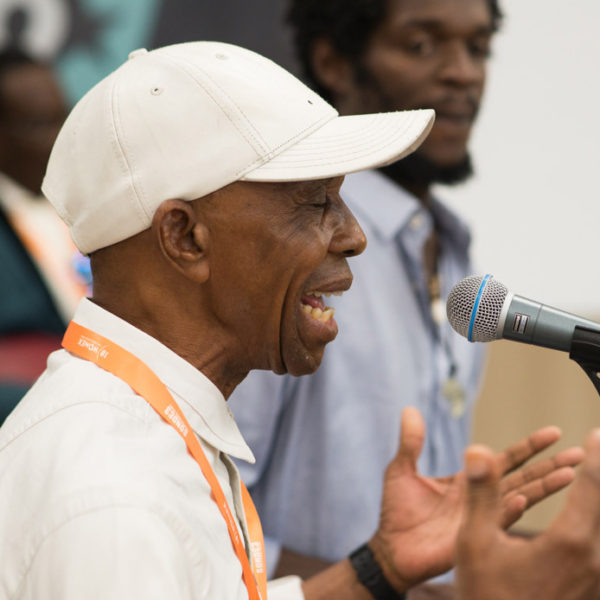
Related Articles
